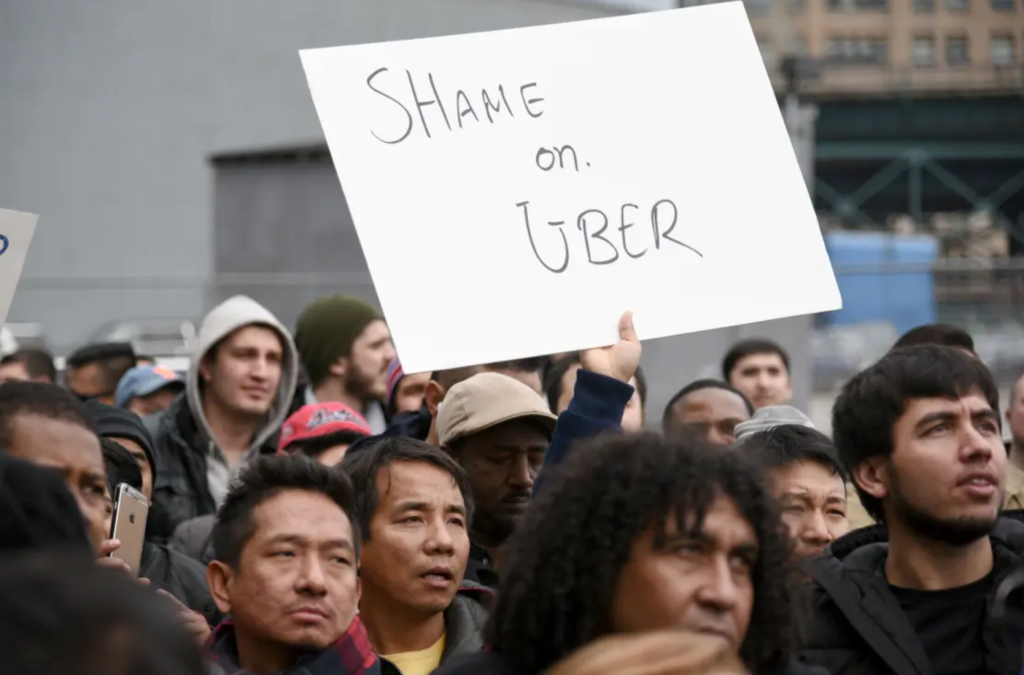Cet article aborde sous un angle assez large les “Uber protest” : le fait que les ”gig workers” manifestent face à leur situation dangereuse, ainsi de comment ils sont montrés dans les pubs des entreprises composant la “gig economy”, comme Uber ou Deliveroo.
1/ Uber protest in San Francisco
This first video is a report which highlights the fact that workers protest in San Francisco, at Uber Head Quarter. Indeed, they want benefits such as social protection – that is to say healthcare insurance, paid vacation, and unemployment benefits – because they are not eligible actually (due to the fact that they are considered as self-employed).
Moreover, they plead/claim for higher wages, they are surnamed “the working poor’’…
Lire plus : la vidéo montrant les manifestations au siège d’Uber
2/ A movie which shows gig economy
This 2nd video is a trailer from “Sorry we missed you’’, a movie which illustrates the gig economy (a pejorative expression which means sharing economy). Gig workers are not well-paid, yet they work around the clock.
In fact, the point of this movie is to show that a society where gig worker and professional workers have the same working conditions is a utopia / a pipe dream.
Finally, the question that arises is how to regulate the gig economy?
Lire plus : Le trailer du film Sorry we missed you
3/ Uber commercial
In another commercial from Uber eats, we can see the case of Manny, a singer who work a side job (uber). In fact, he represents minorities who are not graduated and who juggle between 2 jobs.
Manny has found the balance between his singer career and his odd job. But in reality, the majority of uber workers are not graduated so the only way to work is to be self-employed. The problem is that these jobs are not well paid, i.e., they work around the clock, but they have trouble making ends meet.
However, there is no discrimination because brands like Uber and Deliveroo are gender blind about their workers, they accept everybody.
Finally, the point of this commercial is to show that the American Dream is possible if you work hard, and is to make people believe that gig workers have time for them, but it’s a utopia.
4/ Deliveroo and Uber competition
Deliveroo, which is a fierce competitor of Uber. The paradox in their commercials is that Deliveroo permits to unit a family, but everyone has a different meal, i.e., a different taste.
In fact, the society is said to be individualist, so brands like Deliveroo or Uber eats are fashionable/trendy because they bring people together.
In their ads, the brand wants to show the modern women, who has not for obligation to cook for everybody. This woman has probably a job and she’s emancipated. The goal is to debunk this cliché.
5/ Gig workers dangerous situation
First, gig workers are more likely to have accidents because they use their phone while they are moving. In fact, they need helmet and insurance i.e., the same protection than other workers, to ameliorate working conditions. The problem is that they can’t afford to pay that.
But how can we combine flexibility and social protection?
For example, during the covid-19, uber workers in Brussels were paid just 6$ per days because they were compelled to stay home. Because of their status of “self-employed” they are not eligible to benefits, so they claim for benefits, and they want to be on an equal footing with other workers. Moreover, if they don’t clock in/out they are not paid, and they can’t work “extra-hours’’ because there is no contract.
Plus, there is another problem with these platforms such as Deliveroo and Uber, it’s that they use an algorithm to propose delivery man rather than another, and we don’t know the criteria, there are maybe discriminations.
Finally, brands as Uber and Deliveroo need to comply with human rights and they need to create new rules to ameliorate/improve workings conditions because all workers are on a limbo.
Lire plus : La problématique du télétravail, reliée à celle sur la gig economy
























